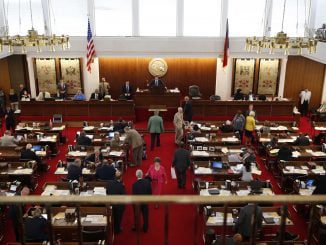
RALEIGH — The procedure for requesting North Carolina mail-in absentee ballots would change and records of those requests would become confidential under legislation advancing after an investigation into a congressional race last fall led to a new election.
The Senate’s elections committee voted Monday for the measure, which would eliminate a statewide absentee ballot request form that can be mass copied, filled out and turned in to local county boards. Instead, individual voters would have to write personal requests, as they used to do, to receive a ballot. The person fills out the ballot, gets witness signatures and sends it in an envelope.
Rolls of the absentee ballot requesters and their identifying information, which are already collected on logs and are available for public inspection, would stay private until the election day if the legislation became law.
The measure responds to recent investigations and accusations of absentee ballot irregularities, particularly within the south-central 9th Congressional District. Allegations initially led the state elections board to decline to certify last November’s 9th District election results. Following a hearing in February, the board ordered a new election, now set for September.
Republican Sen. Ralph Hise of Mitchell County says the bipartisan bill he’s sponsoring seeks to discourage illegal “harvesting,” or when someone takes another person’s actual mail-in ballot, either to fill it out or destroy it. While it’s lawful for people to collect absentee ballot requests and submit them to county boards, only the voter or a close relative can handle the actual mail-in ballot.
Hise said mass-copied ballot applications opened the door to political workers “potentially fraudulently submitting them themselves.”
Witnesses in the 9th District hearing described political operative Leslie McCrae Dowless and his assistants gathering absentee ballots from Bladen County voters. Workers testified they were directed to collect blank or incomplete ballots, forge signatures on them and even fill in votes for local candidates. Dowless and four other people were charged in state court on charges related to work in other elections.
The legislation, which now goes to another Senate committee, also would create new crimes or increase criminal penalties for illegal harvesting activities.
State law already directs that mail-in absentee ballot voters will now comply with a new photo identification mandate just like in-person voters. But the bill says an ID copy must now be turned in with a person’s application letter and eliminates the option to turn it in with the completed ballot.
State elections board Executive Director Karen Brinson Bell asked senators in the committee to consider requiring the ID or an exemption certificate to be turned in with the completed envelope, saying that process was more secure.
A separate provision in the bill would restore early in-person voting on the final Saturday before the primary or election day. The Republican-controlled legislature passed laws last year to adjust the 17-day early voting schedule so that it would end on the Friday before the election in future elections. But election advocates said the final Saturday was extremely popular, especially for people who worked during the week.



